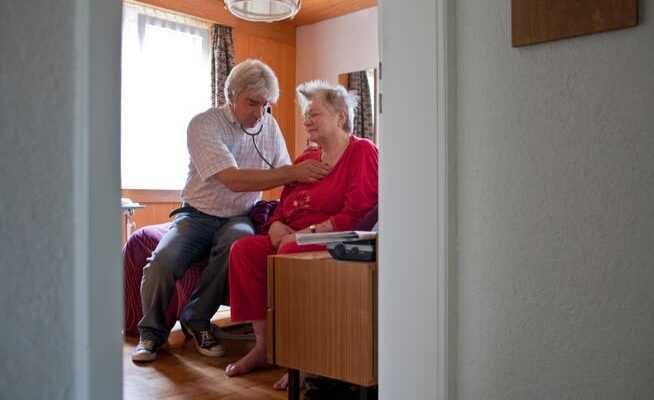Even the launch of the doctor’s phone was accompanied by discord. Now the story has taken a new turn.
There is a lack of general practitioners in the canton of Zurich. The doctor’s phone should help.
It all started with a fight: municipalities against doctors, parliamentarians against the government, doctors against doctors. The outpatient emergency service, which takes care of emergencies that are not life-threatening, got off to a difficult start in the canton of Zurich. Six years have passed since the medical phone was launched in Zurich. Calm has returned in recent years, but old wounds were reopened in the canton on Monday morning.
The topic was three old advances that dealt with the doctor’s phone. And because SVP changed her mind at the last moment, a new chapter was added to the tangled story, one with an open end.
But let’s go back to the beginning for a moment. In 2016, the Zurich Medical Association launched a new model for outpatient emergency services in the canton. The background was the lack of general practitioners and the sometimes poor care in smaller communities. A switchboard should remedy the situation, put patients looking for advice in contact with general practitioners who work evenings or weekends, or solve problems directly on the phone. For the service, the medical society demanded ten francs per inhabitant from the communities. But it was far too expensive for them, and they accused the doctors of blackmail. Meanwhile, regional medical societies wanted to set up a competitive offer.
In the end, the government council mediated between the municipalities and doctors and promised a financial contribution. Because things had to be done quickly, the necessary law was pushed through the cantonal council, which in turn angered the parliamentarians. In 2019, there was also criticism from the cantonal financial control and the finance committee of the cantonal council. Both the financing and the fact that the order to the medical association had never been put out to tender by the canton were criticized.
Criticism also fed into three parliamentary initiatives, and these were debated in Council on Monday. Each contained a requirement. The price should be limited to a maximum of two francs per capita for the communities, the communities should retain the freedom to run their own service, and the contract should still be put out to tender.
The first two questions had no chance in the Council. The costs are already within the required range – around four francs per capita, divided equally between the canton and the communes – and the doctor’s hotline with the number 0800 336 655 has become established in the canton. The clear majority was therefore of the opinion that parallel structures with their own emergency numbers could not be tolerated.
However, the most important demand, that of the tendering of the performance contract, was successful. And that was a surprise. This was due to the SVP, which had swung to the line of the FDP and the GLP just a few days before the meeting. As a compromise, the SVP had introduced that the tender should not be made for next year, but only for 2027.
Lorenz Habicher (svp., Zurich) admitted that the pendulum had swung back and forth several times at the SVP. With the postponement to 2027, however, a good solution was found. The tender needs it to create clarity and to have a clean layout. The GLP cantonal councilor Christoph Ziegler (Elgg) added that the half-baked law had to be improved, even if the doctors’ phone was now working quite well.
The SP didn’t think much of the SVP’s change of heart. Esther Straub (sp., Zurich) speculated that the hospitals might have lobbied behind the scenes. They probably wanted to run the switchboard in order to be able to refer more patients themselves, which would ultimately lead to rising healthcare costs. “We also criticized the power play of the medical society at the time, but we clearly believe that the matter belongs in their hands.” Especially since there is now transparency in the financing and the costs have fallen.
Health director Natalie Rickli also spoke out against the tender. The model has proven itself and the canton is taking a close look. A tender is also not necessary from a legal point of view. And Rickli warned of the consequences this could have. Because it is not just about operating a switchboard, but also about organizing the emergency services, it would be difficult for anyone other than the medical association to take over. “For another operator, doctors would hardly commit to providing emergency services.”
That didn’t change anything about the majority. With 91 to 74 votes, the council voted in favor of the tender. So the turbulent story continues.
The FDP cantonal councilor Thomas Vogel resigns
zge. A former hope of the Zurich liberals is leaving politics: Thomas Vogel (Thalwil) announced his resignation from the cantonal council on Monday. After 19 years on the council, he wanted to concentrate on his job and other mandates, his party said. Vogel had been leader of the FDP parliamentary group for many years. In 2019 he ran for the Zurich government council, but was not elected. At that time, the FDP lost its second seat in the cantonal government.
Vogel’s successor is Andreas Juchli. The doctor and entrepreneur is President of the FDP district of Pfäffikon. Juchli is the head and owner of JDMT Medical Services AG. The company operates contact tracing for the canton of Zurich.
